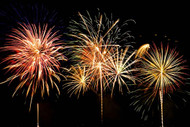Fireworks And Your Parrot
Posted by Parrots and Fireworks, Parrot Fears, Parrot Stress, Parrot Safety, How can I tell if my Parrot is stressed? on 31/10/2023
Liz Wilson has advice on helping your Parrot manage fireworks.
This time of year in the UK, you encounter the same problem we Americans see on the 4th of July – when the explosions and bright lights of fireworks tend to frighten our companion Parrots.
Our countries also share this type of celebration on New Year’s Eve.
What can we do to eliminate or at least decrease this fear?
As someone who has lived with a firework-“phobic” Blue and Yellow Macaw “Sam” for 35 years, I fully understand the gravity of this problem. It was her visceral response to the loud BANG of a firecracker that taught me that a Parrot with clipped wings could still fly if enough adrenalin was pumping in her system. (This happened thirty-five years ago and led to my decision to allow her flight from then on.)
On another memorable 4th of July, I was working the later shift and didn’t return from the veterinary hospital until 11:30 PM. At that point, Sam still lived on a very large perch, as she had with her previous owners. When I arrived at my home, the first thing that registered as I turned on the lights was that the perch was empty. Uh oh.
So I looked around and found Sam hanging on a large hand-hooked rug I had made to decorate the wall. She had obviously been there for several hours, as evidenced by size of the pile of droppings that festooned the television that was located below her, both on the back and into the vents in the rear. Sam had apparently bolted in the dark and latched onto the first thing her claws could sink into, and she was extremely pleased to see me.
Television
Hanging on the wall for hours in the darkness could not have been fun for her! (As an aside, my television appeared to resent deeply the presence of Macaw poo in its innards, as it did not work for several months, until Sam’s droppings fully dried inside the television, at which point it started working again.)
To avoid a repeat of this incident, I made certain that Sam lived in a cage before the next July 4th. I also strove to alleviate her terror of loud bangs, and utilized tricks that years later have helped other Parrot people with the same problem.
First thing I did was cover the windows with blankets so Sam could not see the bursts of light, as I assumed (but did not know) that they frightened her as well. In the future, I recommended moving Parrots into rooms with no windows (such as bathrooms) if such a room existed.
The most important thing to mask was the loud bang, so I sought ways to decrease her ability to hear such things. The blankets muffled the noise a little, so this helped. In addition, I turned on a white noise machine (in my case, an air filter) and turned on a favourite loud rock and roll station to also help in drowning out the noise. This helped a great deal, and Sam no longer reacted to fireworks.
But what can we do for birds in outside aviaries?
I have little experience with this kind of situation, so I consulted my colleagues in the Parrot division of the International Association of Animal Behaviour Consultants (www.iaabc.org).
Karen Webster, Parrot behaviour consultant and founder and chair of the Anchorage, Alaska chapter of the Parrot Education and Adoption Center (www.peac.org) suggested the use of the landscape architectural trick of plantings of trees for those who want long-term relief.
For more short-term relief, stacks of hay bales also muffle sound effectively. She also suggested the utilization of large commercial fans (not aimed at the birds) to create white noise.
German Parrot behaviour consultant Hildegard Niemann commented that “Noise is normally not the problem (Parrots are noisy by themselves), but the sudden appearance of an unknown noise.
DVD
Maybe the owner can put a DVD-Player beside the aviary and play unknown noises several times a day. With time the Parrots will learn that unknown noise does not do them any harm.”
Parrot behaviour consultant, aviculturist and pet storeowner Jamie Whitaker added these thoughts:
“I have had lots of aviary birds and they generally get used to noise. I have known birds to breed and sit and hatch babies within 100 feet of a railroad track. If it is sudden loud noises, like fireworks, there is going to be a possibility of eggs getting damaged, but the birds usually manage to get used to it, at least that has been my experience.”
A few years ago, celebrated African Parrot breeder Jeannie Pattison made an interesting comment about wild caught versus domestic bred Parrots in breeding situations. She lives in the warm state of Florida, so her breeding birds are outside throughout the year.
She had observed that the domestic bred Parrots seemed unsure as to what was actually dangerous (such as a buzzard overhead) and what was not (such as the sound of fireworks).
As a result, her inexperienced domestic pairs tended to teach their babies to over-react when confronted with a novel experience. Once they became more experienced and worldly, that ceased.
So with a little advance planning, you can help your Parrots learn not to hate Guy Fawkes Night and New Year’s Eve!
This article was originally published in October 2012.

